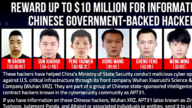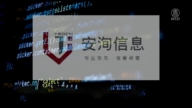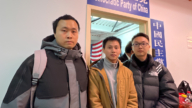【新唐人2014年11月20日訊】中國是世界上最大的互聯網市場,目前擁有6.3億網民,佔全世界網民總數的五分之一。不過,在中國大陸當局對網民實施各種網絡審查和監管措施,嚴格程度在全球也是「名列前茅」。那麼由這個對網絡管控最為嚴格的國家來舉辦「世界互聯網大會」,又會有甚麼樣的結果呢?國際特赦組織的中國研究員說,「這足以讓所有珍重互聯網自由的人都感到脊背發涼。」
11月19號,由中共國信辦和浙江省政府舉辦的「世界互聯網大會」,在中國烏鎮拉開帷幕。
為期三天的會議,以「互通互聯、共用共治」為主題。據了解,為了吸引西方國家的注意,主辦方事先把中國三大網絡巨頭的百度、阿里巴巴、騰訊等企業家公開在網上,以便招來更多國際大型的網絡公司參與。
根據中共互聯網信息辦公室主任魯煒的說法,舉辦世界互聯網大會,就是要搭建兩個平臺:一個是為中國與世界互聯互通搭建國際平臺,一個是為國際互聯網共享共治搭建中國平臺。
復旦大學歷史系教授馮煒:「我作為一個局外人、作為一個旁觀者來看,我想中國在這方面,至少在整個互聯網世界裡面它也要掌握一定的話語權。」
英國廣播公司《BBC》中國總編輯凱利分析說,擁有全球四分之一網民的中國,已決心在國際互聯網領域扮演更重要的角色,希望參與互聯網規則的制定。
然而西方網絡公司最關心的,莫過於中共對互聯網的管理政策,因為這些政策,將直接影響到他們未來在中國市場的發展。
事實上,在10月下旬,中共國信辦主任魯煒已經明確說過,中國將出臺手機APP管理辦法,並正式實施網絡安全審查制度,外國互聯網企業進入中國,底線就是要符合中國的法律法規。
復旦大學歷史系教授馮煒:「特別強調的一點,就是入境隨俗吧,說到底就是要按照中國的法律來,那麼按照中國的法律你怎麼理解呢?還涉及到一個中國對有些問題的看法可能跟世界上普遍的看法不一致,比方說,對普世價值中國官方的態度也並不那麼認同。」
人權組織「國際特赦」的中國事務研究員威廉•尼(William Nee)18號表示,中國模式的主要特點是極度控制和壓制,大批審查員時刻監控網民,許多活動人士僅僅因為在網上行使言論自由權就被投入監獄。
中國網民在金盾工程、互聯網防火牆等一系列措施的管控下,無法到訪臉書、推特、YouTube,以及Instagram等全球知名社交網站,甚至是多家海外媒體網站,也一直受到中共方面的屏蔽。
重慶馬甲文化傳播有限公司CEO羅渝:「互聯網時代,是一個推動整個人類社會走向言論自由的一個重要的技術保證,這個技術保證,只要這個技術在發展,人們總會走向自由的。對中國政府最難的挑戰是,它想管制住任何一個言論。」
「國際特赦」認為,中共當局在烏鎮舉辦這屆峰會,顯示中共希望把國內網絡監管規則,提升到全球網絡監管模式的地位,而這應當引起任何珍視網絡自由人士的關注。
另外,根據《BBC》報導,儘管這次會議的官方網站,一早就開放供有意採訪的記者登記註冊,但主辦方對有關記者的申請卻「區別對待」。據統計,這次互聯網大會註冊記者600多名,但境外記者僅佔一成,很多境外記者申請採訪都遭到拒絕。
採訪/秦雪 編輯/黃億美 後製/李智遠
China’s World Internet Conference Threatens Internet Freedom
China is the biggest Internet market in the world, now having
630 million users, which accounts for one-fifth of
internet users around the world.
However, China monitors the internet users and its restriction
measures are also on top list of the world.
So what would the outcomes be when China hosts
a World Internet Conference?
Amnesty International researchers say: This should send a
chill down the spine of anyone that values online freedom.
China’s state information office and Zhejiang Province are
jointly hosting a World Internet Conference in
Wuzhen from Nov. 19.
The three-day conference aims to “promote development of
the internet to be the global shared resources for human
solidarity and economic progress."
In order to attract Western countries and international online
enterprises, three internet giants, Baidu, Alibaba and
Tencent appeared online.
According to China’s internet information director Lu Wei,
China hosting the conference is to set up two platforms:
One is an international platform for a communication link
between the world and China.
Another one is to set up a China platform for sharing and
developing the internet for the world.
Feng Wei, Professor in Fudan University: Being an observer,
I think China wants to hold a certain right to speak.
BBC China editor Carrie Gracie says that China has a quarter
of the world’s internet users, aiming to play a bigger role in
the world internet industry.
It hopes to participate in the internet regulation.
The most concern for Western internet companies is nothing
more than China’s internet management policy.
Because the police will directly influence the development
of China’s market in the future.
Actually, in late October, Lu Wei has clearly said that China
will introduce mobile phone app. regulations.
It will formally implement an internet
security inspection policy.
Any foreign internet company wanting to enter into China,
the bottom line is to follow China’s regulation.
Feng Wei: China specially emphasizes one point—
do as the Romans do.
Generally speaking is to follow China’s regulation.
So how to understand ‘following China’s regulation?’
However, the Chinese view likely is different
from the international view.
For example: universal values are not quite accepted
by Chinese officials.
On Nov. 18, William Nee, China researcher at Amnesty
International: China’s internet model is one of
extreme control and suppression.
There are large-scale inspectors monitoring the
netizens all the time.
Many activists were sent to prison only for their online
freedom of speech.
Under the block of the Golden Shield Project and firewall,
Chinese netizens cannot view Facebook, Twitter, Youtube,
Instagram and other international social networks.
Even several websites of foreign media are blocked
by the Chinese Communist Party (CCP).
Luo Yu, CEO of Chongqing Mask Culture Dissemination
Co. Ltd: The Internet era is an important technology guarantee
for pushing the entire human society towards
freedom of speech.
As long as it develops, people will walk to freedom.
The most challenging for the CCP is it wants to
control all speech.
Amnesty says that China hosts Wuzhen’s conference showing
that the CCP is “eager to promote its own domestic internet
rules as a model for global regulation".
This should draw concern for any internet user who cherishes
the freedom of internet.
According to the BBC, although during the conference, official
websites were opened to journalists for registration, China
side treated some journalists’ applications in a “special way".
Statistics show that over 600 journalists registered
for this conference.
However, only 10% are overseas journalists.
Many overseas journalists were denied applications.
Interview/QinXue Edit/Huang Yimei Post-Production/Li Zhiyuan



























